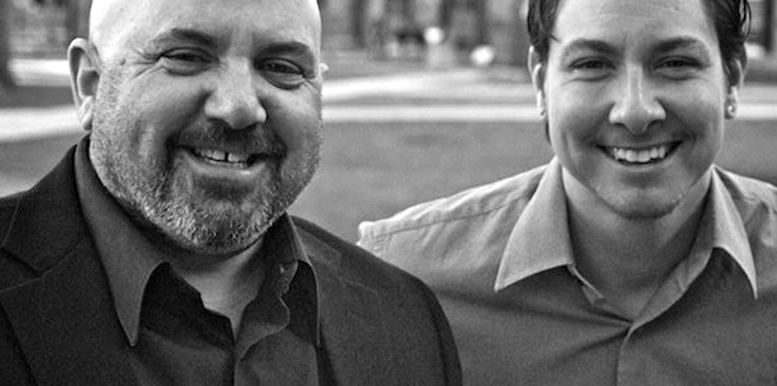Trans Assistance Foundation turns over leadership reigns
By: Jenna Spinelle/TRT Reporter—
M. Dru Levasseur and Tony Ferraiolo have matching “JCF” tattoos on their arms.
Those tattoos symbolize the work they’ve put into building the Jim Collins Foundation over the past 10 years and will serve as lasting memories as they transition out of their leadership positions.
Levasseur and Ferraiolo met at a Yale University panel discussion in 2005 and quickly realized they shared a passion for spreading awareness about gender affirmation surgery and helping members of the transgender community pay for procedures often not covered by health insurance.
“The reason we succeeded was because of our friendship,” Levasseur said. “If one of us was having a hard time, the other one would step in. It’s been a labor of love, and I got a wonderful friend out of it.”
In the early days, Ferraiolo said they heard from many people who told them others had tried to start something similar and their efforts would never come to fruition. Sitting at a picnic table in New Haven, they decided they were not going to listen to those critics.
“The journey was very tough at the beginning,” Ferraiolo said. “But we wanted it to be fun and to take care of each other emotionally. We didn’t listen to people who told us it wouldn’t be successful.”
Levasseur and Ferraiolo announced last month that they would be handing over the reins of the foundation to Jody Cofer Randall and Ryan Sallans, both of whom served on the foundation’s board and are ready to take its work to the next level.
Randall is the lead LGBTQIA administrator at Texas Tech University (TTU). Sallans is a nationally-known transgender speaker, author, and advocate.
Randall will serve as the organization’s president, and Sallans will serve as vice president. Randall said they are hoping to diversify the organization’s board of directors and its funding sources with the hope of making an even greater impact in the trans community.
“Whether through internal operations or the sheer number of people we are able to help, we want to see that capacity grow,” Randall said. “I want us to be a model organization that is serving the trans community on health matters and surgical support.”
The Jim Collins Foundation receives more than 200 applications each year for a just a handful of grants. Sallans and Randall said they were inspired to take leadership positions in the organization after making phone calls to grant recipients and hearing their stories.
“When I was first approached about moving into [the] vice president role, I said no,” Sallans said. “But when you call folks to let them know they receive a grant, that is an experience that words can’t describe.”
Although the foundation is looking to increase its funding in order to provide more grants, leaders acknowledge that it will never be able to meet every applicant’s needs.
That’s not necessarily a bad thing, though, as even the foundation’s existence alone is enough to help in some cases.
“We are saving lives just by being in existence,” Ferraiolo said. “We knew going in that we couldn’t help every single person, but just knowing that the foundation exists gives people hope. We hear from people who say that, although they didn’t get the grant, they are glad for the person who did.”
The foundation is entirely volunteer-run, and its board members are spread out across the country. Sallans and Randall both described it as one of the most active nonprofit boards they’d ever served on.
They are eager to build on what Levasseur and Ferraiolo started, but acknowledge that it might take time to get there. Randall said she could see a point where the foundation brings on paid staff to further support the all-volunteer board.
“We are in a state of transition and have an opportunity [to] say what’s it going to be now that we’ve grown up,” Randall said. “[We] want to get to the point where this work is not needed. [Our] ultimate goal could look like my office is not existing. That’s not where we are as a society.”
Although it’s tough to step away from the something they built, Levasseur and Ferraiolo said they will continue to support the organization as much or as little as needed and will not stop fighting to raise money and awareness about the need for gender affirmation surgery in the trans community.
“It’s not our foundation; the only thing we did was create it,” Levasseur said. “It’s really our community’s foundation and we need to step back and allow room for growth.”
Applications for the 2018 grant cycle and additional information about the foundation are available at https://bit.ly/2ISiv8I.







